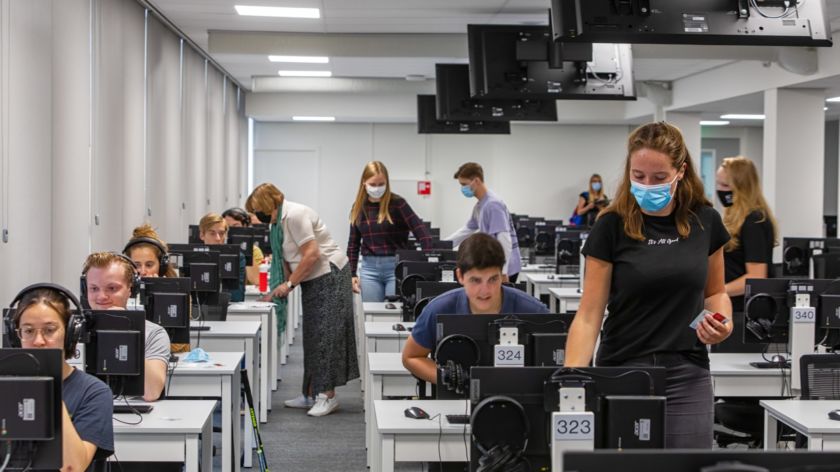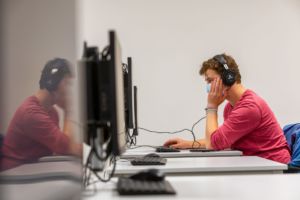Students with COVID symptoms likely to come to campus for exams
-
 An example of an exam in the corona period. Photo by Dick van Aalst.
An example of an exam in the corona period. Photo by Dick van Aalst.
Students and lecturers worry that students with corona or corona-related health issues will come to campus to take their exams. If they don’t, they risk losing an exam attempt. ‘We need to assume students are going to flout the current corona measures en masse.’
Students who choose not to partake in a physical exam because of corona lose an exam attempt, according to the Radboud University rules. Even if they do this out of precaution because of health complaints. In order to gain an extra exam attempt, students could go to their Examining Board, but a positive outcome of such a request is not guaranteed in advance.
Students, as well as lecturers, worry that these students will still come to campus to take their exams. Many faculties have recently started their exam periods, ranging far into January.
Frustrating
“As a general rule: If you have tested positive for the COVID-virus and/or have COVID-related symptoms, you will need to stay at home, even if that means not being able to take an exam.” This message appeared on the Brightspace page of a course at the Faculty of Law. The exam in question took place yesterday.
Law student Benjamin (not his real name) considers this frustrating. ‘I worry about students coming to take their exams while showing COVID symptoms. If you don’t want your study to be delayed, taking your exams is the only option. Or you need to hope that your resit will go well.’
Benjamin himself is very cautious, he does not want to be infected with the coronavirus. But according to him, he has no other option than to take his exams in person. ‘I hope I won’t get infected.’
Worrisome enough
These concerns go beyond the Faculty of Law, knows Roel Veenstra of the University Student Council (USR). He knows of similar discussions at the Nijmegen School of Management and the Faculty of Arts. ‘And students at the Faculty of Social Sciences got a letter during this year’s first exam period saying they should consider whether their COVID-related complaints are serious enough. If that was not the case, they should take their exams physically on campus. Otherwise, they would have to register for a resit.’
Veenstra considers this message to be very worrisome. Those who choose to deregister must worry about a study delay. At the same time, the letter adds to a feeling of insecurity among students. Does everyone make a well-considered choice whether or not to stay at home?
As early as November 5, the student council wrote a letter to the Executive Board, with the question whether more alternatives for exams on campus were possible. In that same letter, the USR asked the board to be clearer in their communication when it comes to exams during a pandemic.
Reaction of the executive board
Martijn Gerritsen, spokesperson for the Executive Board, acknowledges the issues with physical exams on campus. He points out that the board would have liked to keep proctoring as a last resort, but the participation council (UGV) did not agree. ‘Now that this instrument is no longer available, we are unable to offer an equal alternative when it comes to written exams.’
Gerritsen also points out that students who are unable to partake in the first exam attempt due to corona-related complaints can always make use of the second attempt or a re-exam. ‘If you were to fail the course, you could put in a request with the Examination Board. If they believe that there is force majeure, they will usually grant you another attempt. The Examination Board is independent. The Executive Board has no say in their matters, as is the case with other universities.’
According to Veenstra, a solution does not need to be complicated. ‘A third exam attempt already solves a lot. Or if students are unable to attend an oral exam, offer them the chance to attend online. If studies choose not to offer these alternatives, they should state why these options do not work for them.’
Law student Benjamin agrees. ‘Give an extra attempt to students that are quarantined or experiencing health issues. Or offer the chance to take your exam online. I find it strange they have chosen not to make use of the same infrastructure again (see below about proctoring, ed.).’
Surveillance
Not only students, but also professors and other lecturers have spoken to Vox about their displeasure concerning the uncertainty around the exams. ‘If there is no alternative for in-person exams, we need to assume students are going to flout the current corona measures en masse,’ mails an anonymous lecturer.
Unlike students, lecturers are not a fan of a third exam attempt. That would create an even bigger workload for lecturers, possibly even during the Christmas break. ‘Radboud University shouldn’t want them (the lecturers, ed.) to have to work on an alternative exam during their second week.’
Cancelling one of the exam attempts is not a good idea either, finds the lecturer. ‘We can’t do that to them,’ is stated in the email.
Proctoring
Last academic year, study programmes were able to make use of the online video surveillance of Proctorio for their online exams. However, at the request of the participation council, the use of Proctorio was banned last year on the grounds of student wellbeing and privacy, which was against the wishes of the Executive Board.
Still, two faculties do not agree with the proctoring ban. In October, participation council members of the Faculty of Law wrote in a letter to the Executive Board that studies should be able to decide themselves whether they want to use Proctorio. ‘Last week, the Faculty of Medical Sciences also sent a letter to the Executive Board with the same arguments in favour of the use of proctoring,’ says Roel Veenstra of the University Student Council.
The issue might be discussed during the next General Meeting, which will however not take place until January. Either way, the USR is not a fan of the system. ‘Proctoring is not the holy grail when it comes to corona,’ says Veenstra. ‘An informal investigation at the University of Twente showed that students could still cheat while using Proctorio. Alternatives do exist: they could for example look at ways to let students attend physical exams via Zoom, a program that does not capture video recordings.’




